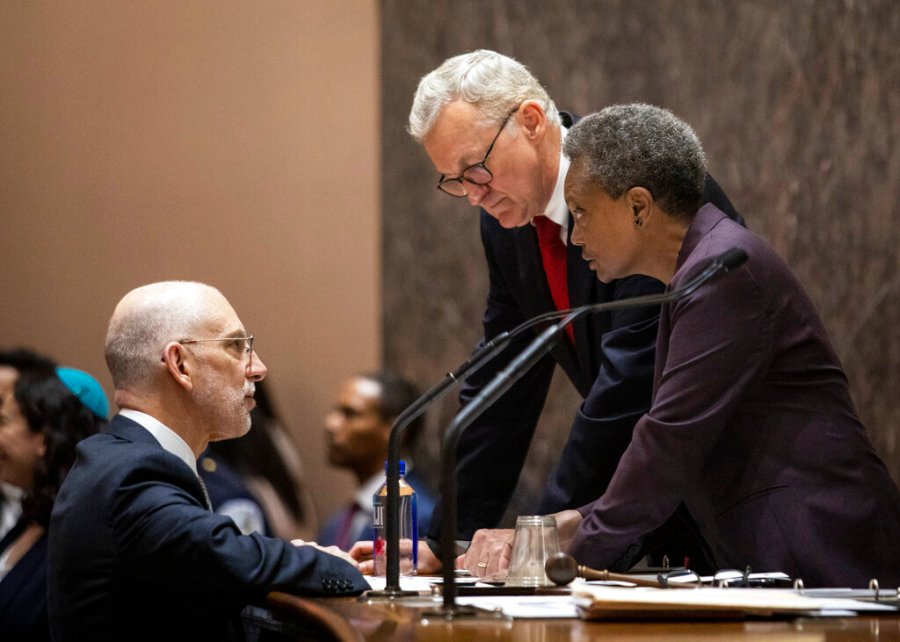Chicago officers involved in wrong raid placed on desk duty

Chicago Mayor Lori Lightfoot speaks during a press conference at City Hall on Thursday, Dec. 17, 2020. She discussed the video of Chicago police mistakenly searching the wrong house and said the city will no longer withhold video from residents seeking police records of their own incidents. (Anthony Vazquez/Chicago Sun-Times via AP)
CHICAGO (AP) — Chicago police officers who wrongly raided the home of a Black woman who wasn’t allowed to dress before being handcuffed have been placed on desk duty, Mayor Lori Lightfoot said Monday.
The announcement comes a day after Chicago’s top lawyer resigned in the fallout of the February 2019 incident where officers executed a search warrant on the home of social worker Anjanette Young. Body camera video of the incident, first aired by Chicago’s WBBM-TV, and a series of missteps by the city have sparked outrage nationwide.

Lightfoot said at a Monday news conference that she sought and accepted the resignation of Corporation Counsel Mark Flessner, which was among several corrective actions the city would take. She named her counsel and senior ethics advisor, Celia Meza, as interim city attorney. She has previously said the city will make it easier for victims to get police video.
“People, and particularly Black people here in Chicago but really across the country, feel angry and feel violated. I also feel more motivated than ever. Now is the time for action,” said Lightfoot, who is Black. “Trust has been breached, trust in our city, trust in me. And that is a trust which I understand and will win back.”
Chicago police spokesman Tom Ahern said 12 officers connected to the incident were placed on administrative duty effective Monday. He declined to break down their rank, citing personnel issues. The officers will remain on desk duty until the outcome of an investigation by the Civilian Office of Police Accountability.
Lightfoot has apologized to Young for the handling of the incident. The city denied Young’s November 2019 Freedom of Information Act request for video of the incident and unsuccessfully tried to block footage from airing last week. Young obtained the video through a lawsuit with the city, but Lightfoot acknowledged last week that she was not given complete footage, which was then released publicly.
In the footage, Young repeatedly pleads with officers that they have the wrong home and there are no guns in the home. She had returned home after work and was undressing for bed when police barged into her apartment.
Young has said she wants accountability, even if it means having the disturbing and humiliating images public. Her attorney Keenan Saulter has said Chicago’s actions are part of its history of trying to hide unfavorable video. Saulter didn’t immediately return a message seeking comment Monday.
Former Mayor Rahm Emanuel’s administration was under fire for blocking the release of police video of the October 2014 killing of Black teenager Laquan McDonald, who was shot 16 times by white police officer Jason Van Dyke. After a judge’s order, months after Emanuel survived a mayoral runoff election, the city released the video in November 2015, prompting months of protests. Van Dyke was convicted and sentenced to prison.
The city later implemented a policy to release all video in police shootings and other incidents within 60 days. The first batch in 2016 of more than 300 video clips of 101 incidents include a host of violent encounters between officers and the public. They included an officer slamming his baton into the side of a man’s head with such force that his hat flies off and another of an officer slamming a woman face-first into the hood of a car.














